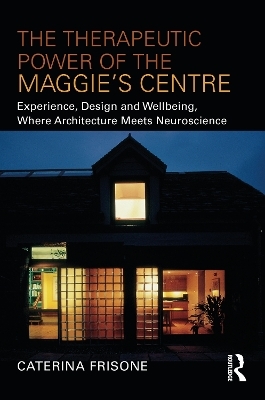
The Therapeutic Power of the Maggie’s Centre
Experience, Design and Wellbeing, Where Architecture meets Neuroscience
Seiten
2024
Routledge (Verlag)
978-1-032-15457-2 (ISBN)
Routledge (Verlag)
978-1-032-15457-2 (ISBN)
This book explores the many ways in which the therapeutic environment of the Maggie’s centre is achieved. The book critically evaluates the Maggie’s centre as a model to be applied to other healthcare facilities and to architecture in general. It is essential reading for any student or professional working on therapeutic environments.
This book is about the therapeutic environment of the Maggie’s centre and explores the many ways this is achieved. With an unconventional architecture as required by the design brief, combined with Maggie’s psychological support programme, this special health facility allows extraordinary therapeutic effects in people, to the point that one can speak of therapeutic power.
After tracing the story of the Maggie’s centre, the book reveals its fundamentals: Maggie’s Therapeutikos (the-mind-as-important-as-the-body), the Architectural Brief and the ‘Client-Architect-Users’ Triad. It continues by unfolding Maggie’s synergy-that between people and place-which increases users’ psychological flexibility helping them tolerate what was intolerable before. Although comfort and atmospheres are paramount, they are not enough to define the therapeutic environment of the Maggie’s centre. Only by looking at neuroscience that can give us scientific explanations of empathy, feelings and emotions and only considering space neither neutral nor empty, but full of forces that envelop people in an embodied experience, can we explain what generates wellbeing in a Maggie’s centre.
The book concludes by critically evaluating the Maggie’s centre as a model to be applied to other healthcare facilities and to architecture in general. It is essential reading for any student or professional working on therapeutic environments.
This book is about the therapeutic environment of the Maggie’s centre and explores the many ways this is achieved. With an unconventional architecture as required by the design brief, combined with Maggie’s psychological support programme, this special health facility allows extraordinary therapeutic effects in people, to the point that one can speak of therapeutic power.
After tracing the story of the Maggie’s centre, the book reveals its fundamentals: Maggie’s Therapeutikos (the-mind-as-important-as-the-body), the Architectural Brief and the ‘Client-Architect-Users’ Triad. It continues by unfolding Maggie’s synergy-that between people and place-which increases users’ psychological flexibility helping them tolerate what was intolerable before. Although comfort and atmospheres are paramount, they are not enough to define the therapeutic environment of the Maggie’s centre. Only by looking at neuroscience that can give us scientific explanations of empathy, feelings and emotions and only considering space neither neutral nor empty, but full of forces that envelop people in an embodied experience, can we explain what generates wellbeing in a Maggie’s centre.
The book concludes by critically evaluating the Maggie’s centre as a model to be applied to other healthcare facilities and to architecture in general. It is essential reading for any student or professional working on therapeutic environments.
Caterina Frisone earned her PhD and was Associate Lecturer in Interior Architecture at Oxford Brookes University, UK. She is now the Scientific Director of the Postgraduate programme ‘Master in Architecture and Health’ at the University Iuav of Venice.
1.Introduction 2. Maggie’s Therapeutic Environment 3. The Maggie’s centre 4.Maggie’s Fundamentals 5.Maggie’s Synergy 6.Maggie’s Phenomenology 7.Maggie’s as a Paradigm and the Future of the Architecture of Care 8.Epilogue
| Erscheinungsdatum | 09.05.2024 |
|---|---|
| Zusatzinfo | 4 Tables, black and white; 6 Line drawings, black and white; 52 Halftones, black and white; 58 Illustrations, black and white |
| Verlagsort | London |
| Sprache | englisch |
| Maße | 156 x 234 mm |
| Gewicht | 639 g |
| Themenwelt | Studium ► Querschnittsbereiche ► Prävention / Gesundheitsförderung |
| Naturwissenschaften ► Biologie ► Humanbiologie | |
| Naturwissenschaften ► Biologie ► Ökologie / Naturschutz | |
| Naturwissenschaften ► Biologie ► Zoologie | |
| Technik ► Architektur | |
| ISBN-10 | 1-032-15457-8 / 1032154578 |
| ISBN-13 | 978-1-032-15457-2 / 9781032154572 |
| Zustand | Neuware |
| Informationen gemäß Produktsicherheitsverordnung (GPSR) | |
| Haben Sie eine Frage zum Produkt? |
Mehr entdecken
aus dem Bereich
aus dem Bereich
Wissenschaftlich basierte Empfehlungen, Tipps und Ernährungspläne für …
Buch (2022)
Thieme (Verlag)
51,00 €
Orthomolekulare Medizin in Prävention, Diagnostik und Therapie
Buch | Hardcover (2022)
Thieme (Verlag)
71,00 €


